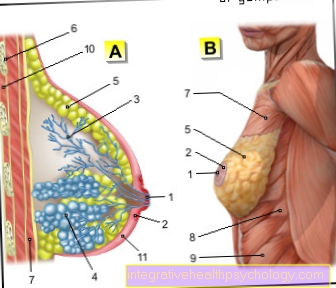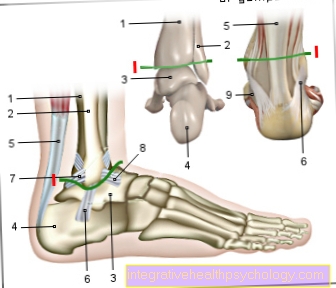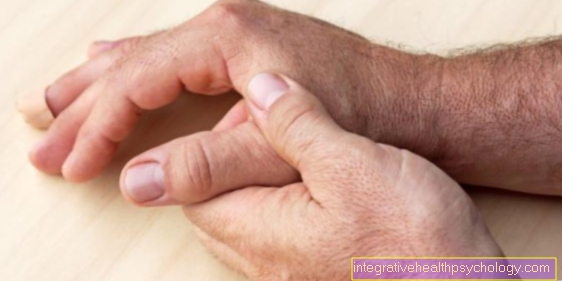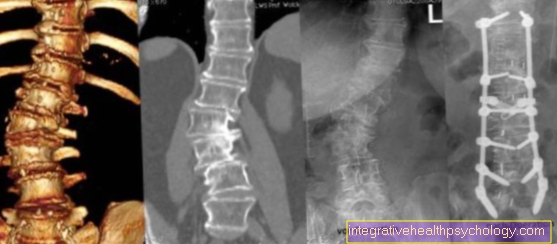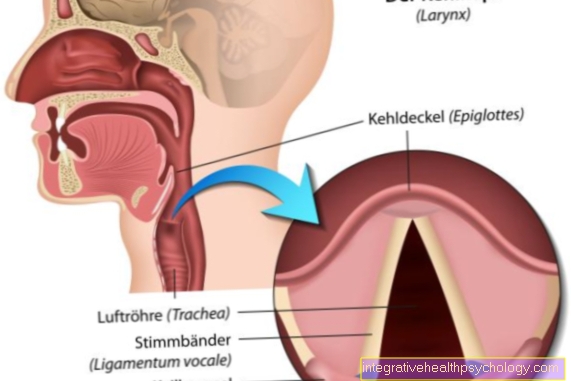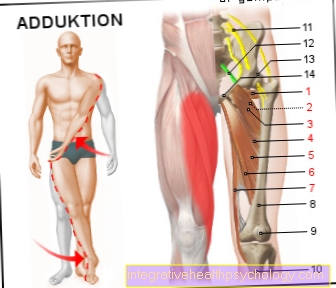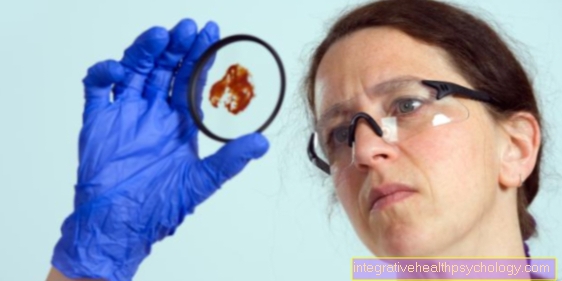Swelling under the eyes
introduction
A swelling under the eye usually describes a build-up of fluid in the soft tissue. The swelling becomes visible either in the form of a tear sac or as edema. Inflammation, injuries or allergic reactions change the permeability of the small blood and lymph vessels under the eye. As a result, more water escapes from the vessel into the tissue; this accumulation of fluid is referred to medically as edema.
Read more on the topic: Swollen eyes

causes
There are several possible causes of puffy eyes. In many cases, puffy eyes are completely harmless, for example after a long cry or a short night. An unhealthy lifestyle with excessive alcohol consumption, smoking and the consumption of heavily salted foods also leads to waking up the next morning with puffy eyes.
Read more on the topic: Swollen bags under the eyes
Apart from that, there are also pathological causes for puffy eyes. These include allergic reactions or external irritation, for example from cigarette smoke, fine dust or chemicals. Infections caused by viruses or bacteria can also cause swelling around the eyes. Of course, the eye can also swell if there are injuries to the face (e.g. bruises or fractures).
Read more on the topic: Swelling of the eyes
allergy
In a great many people, puffy eyes are caused by allergies. In most cases, the triggers are pollen, house dust mites or animal hair. Typically, the puffy eyes of an allergy are accompanied by other symptoms such as reddened and watery eyes, itching in the eyes and nose, and frequent sneezing. To find out if you have an allergy and what to do with it, the doctor will perform a number of different tests. The people affected then try to avoid the allergen (i.e. the allergenic substance) as much as possible. If this is not possible, the allergy can usually be treated with medication with cortisone-containing preparations or antihistamines.
Read more about the topics:
- Symptoms of an allergy
- House dust allergy
Insect bite
Very often, insect bites in the area of the eye cause severe swelling at the puncture site. The insect venom released by the bite triggers an inflammatory reaction in the body, which makes the vessels permeable and fluid collects in the surrounding tissue. Accompanying symptoms are redness and itching. The body reacts differently, depending on which insect has stung: Mosquito bites tend to lead to minor swellings, whereas bee stings usually lead to strong reactions.
An insect bite is usually harmless and the swelling on the eye will go away on its own after a few days. However, be careful with allergies! If you have a very known allergy, severe swelling or if you experience difficulty breathing after an insect bite, you should consult a doctor immediately. A strong allergic reaction is an absolute emergency, as it is life threatening for the person concerned.
Read more on the topic: Insect bite
Cheekbone contusion / broken cheekbone
Injuries to the face can cause swelling of the eye. Blows, falls or collisions often lead to cheekbone contusions or even cheekbone fractures. The cheekbone (also called the cheekbone) forms the bony border of the lateral eye socket in the direction of the temple.
External force can quickly bruise or break this structure. Injuries to the cheekbone cause severe pain all over the face. In addition, a bruise forms around the eye and the tissue becomes very swollen. Whether the cheekbone is bruised or actually broken can only be determined with an X-ray examination.
In the event of an injury to the face and severe pain, a doctor should always be consulted. The main treatment for a bruise is adequate cooling to reduce the swelling. A fracture can be treated either conservatively or surgically, depending on the type of fracture. The patient is given painkillers for the pain.
Read more on the topic: cheekbone fracture
Concomitant symptoms
Eye swelling can appear alone or be accompanied by various symptoms. The type of accompanying symptoms depends primarily on the cause of the swelling.
In the case of an allergic reaction, redness, watery eyes, severe itching, sneezing and a runny nose are typical side effects.
Mosquito bites on the eye not only cause swelling, but also very annoying itching and redness at the puncture site.
If the swelling in the eye was caused by trauma or injury, there may be other symptoms. These include fractures of the skull bones, bruises, hematomas or skin injuries. The affected people then often also suffer from pain.
Read more about the topics:
- Reddened eyes
- Pain in the eye
- Itchy eyes
Pain
Swelling in the eye is in many cases harmless and does not cause pain. Above all, fractures in the skull area or facial injuries, which cause the swelling, are often very painful. In such cases, careful cooling with ice packs can alleviate the pain somewhat and ensure that the swelling goes down. When cooling, make sure that the cooling bag is wrapped in a towel so that it does not come into direct contact with the skin.
Ointments or tablets with pain-relieving ingredients also help against the symptoms. In any case, severe pain must be clarified by a doctor and should not be treated on your own.
treatment
The therapy for puffy eyes depends on the particular trigger. If the swelling occurs as a result of a short night or long crying, you can initially cool your eyes as a first aid measure. Cold has the effect of constricting the blood vessels and leads to the excess fluid being transported away from the tissue. Usually, puffy eyes do not need further treatment if they are harmless.
Swelling caused by inflammation may need to be treated by an ophthalmologist. The use of antibiotics may be necessary for bacterial infections. Allergies are treated with antihistamines or preparations containing cortisone.
diagnosis
Doctors diagnose a swollen eye by examining the eye. The swelling can usually be seen at first glance. The doctor may also do various tests, such as an eye test and an ocular fundus, to help diagnose the cause of the swelling. If an allergy is suspected, various allergy tests (prick test or provocation test) and a blood sample are carried out. After these examinations, in most cases the doctor has at least a suspected diagnosis and can plan the treatment accordingly.
Duration
Swelling in the eye can last different lengths of time. Swelling that occurs after getting up usually disappears within a few hours. If the eyes are swollen as a result of an allergic reaction, the swelling disappears relatively, the allergy-causing substance disappears quickly or as soon as an antiallergic treatment (e.g. eye drops) has been carried out. If swellings persist for more than a day or keep recurring for no apparent cause, those affected should definitely consult a doctor.
Swelling only on the eyelid
The eyelid is a very delicate structure made up of tiny muscles and a thin layer of skin. Accordingly, the eyelid is very sensitive to irritation or infection. Often, swelling that only affects the eyelid is caused by inflammation of the glands on the edge of the eyelid. The sebum glands (also called meibomian glands) can become clogged and infected, the resulting clinical picture is called chalazion or hailstone. Likewise, bacterial inflammation of the eyelid margin (blepharitis) leads to swelling and reddening of the affected eyelid.
Read more on the topic: eyelid swelling

